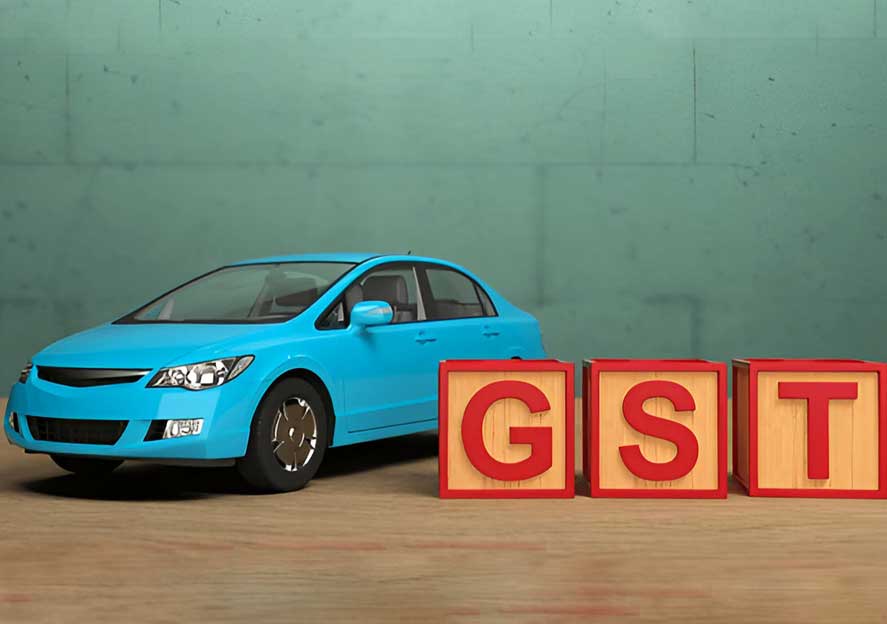
The Indian auto industry has reacted positively to the recent Goods and Services Tax (GST) rate cuts on various automobile categories, including commercial vehicles, effective from September 22, 2025. Industry leaders have praised the decision, anticipating improved vehicle affordability for consumers and a boost in market demand—particularly ahead of the festive season. Here are the responses from key stakeholders, including manufacturers, industry bodies, and analysts, to this significant policy change.
Ms. Shradha Suri Marwah, President, ACMA:
“On behalf of the auto component industry, I extend our deep gratitude to the Hon’ble Prime Minister, Shri Narendra Modi, and the Hon’ble Finance Minister, Smt. Nirmala Sitharaman, for this historic reform. The rationalisation of GST to a uniform 18% across all auto components has been a long-standing recommendation of ACMA. This decisive step will curb the grey market, encourage the use of quality compliant components, ease compliance, and support MSMEs – thereby strengthening the global competitiveness and resilience of India’s USD 80.2 billion auto component industry.”
She added, “We also welcome the GST Council’s approval for faster export refund claims through ICEGATE for smaller exporters, which will help clear pending shipping bills and significantly ease liquidity constraints.”
Mr C S Vigneshwar, President, FADA:
“The 56th GST Council meeting marks a watershed moment for India’s automobile retail industry. FADA warmly welcomes the bold and progressive reforms which simplify the tax structure, lower rates for mass mobility, and bring consensus across all States. This is a decisive step that will boost affordability, spur demand, and make India’s mobility ecosystem stronger and more inclusive.
We thank the Hon’ble Prime Minister, Finance Minister, and the GST Council for taking such a courageous decision with unanimity. As the country heads into the peak festive season, glitch-free and implementation will be the key to ensuring that the benefits seamlessly reach customers. One area that may needs earliest clarification is about levy and treatment of cess balances currently lying in dealers’ books, so that there is no ambiguity during transition.
FADA remains committed to working closely with the Government and GST Council to make GST 2.0 a model reform — simple, transparent and growth-oriented for both industry and consumers.”
Mr. Shailesh Chandra, President, SIAM:
“Automobile Industry welcomes the Government’s decision to reduce the GST on vehicles to 18% and 40%, from earlier rates of 28% to 31% and 43% to 50%, respectively, especially in this festive season.
This timely move is set to bring renewed cheer to consumers and inject fresh momentum into the Indian Automotive sector. Making vehicles more affordable, particularly in the entry-level segment; these announcements will significantly benefit first-time buyers and middle-income families, enabling broader access to personal mobility.
We also thank the Government of India for continuing with GST rate of 5% on Electric Vehicles, which will help sustain the ongoing momentum towards sustainable mobility.
Furthermore, the resolution of classification interpretations and the correction of the inverted duty structure will greatly streamline business processes across the automotive industry, supporting ease of doing business.
We are confident that the Government will also soon notify suitable mechanisms for the utilisation of compensation cess on unsold vehicles, ensuring a smooth and effective transition.”
Mr. Sudarshan Venu, Chairman, TVS Motor Company:
“We applaud the government for taking consistent steps towards boosting growth and enhancing the growing middle class’s spending power – all towards realising PM’s vision of Viksit Bharat 2047. The GST tax cuts is a major move by the government to further turbocharge growth. It will significantly boost consumption across segments of the society. For our industry especially, it’s a welcome move as it will help 2Ws become more accessible and also help those looking to upgrade.”
Mr. Ajinkya Firodia, Vice Chairman, Kinetic India:
“ We welcome this very positive and timely move by the Government. The GST rate cut will give a strong boost to the economy in an unprecedented manner. Essentials, including food, automobiles, and several other key sectors, have been rightly covered under this decision. “
” This step aligns with the vision of making India self-sufficient—an Atmanirbhar Bharat. It will lower interest rates, facilitate employment generation, and encourage capacity augmentation across industries. “
” Our only humble request is that the electric vehicle (EV) sector continues to be kept in special focus. To ensure higher penetration of EVs, especially two-wheelers, we urge the continuation of supportive schemes so that this transformative sector does not face any adverse impact. EV adoption is critical for India’s sustainable growth and competitiveness “
Mr. SWAPNESH R MARU, Deputy Managing Director, Toyota Kirloskar Motor
“We thank and congratulate the Government for the landmark second generation GST reform, a significant step towards accelerating India’s journey to a stronger and more resilient economy. Beyond empowering the common man, this reform is poised to enhance market confidence, strengthen consumer sentiment and stimulate investments — collectively broadening prosperity across the nation. The relief extended to smaller vehicles, along with the rationalization of levies on larger ones, will enhance mobility for the common man by making it more accessible and affordable, while at the same time stimulating growth across the automotive sector.
As a next step , it is essential to reduce fossil fuel imports and achieve our stated national objectives of energy self-reliance, promotion of bio-fuels and decarbonisation. Given India’s rapid economic growth that is bound to increase the demand for energy, particularly fossil fuel consumption by transportation sector, it is crucial that all cleaner and greener technologies are also promoted and incentivised through suitable policy measures, including taxation so that these are preferred by consumers over the conventional petrol and diesel vehicles.”
Mr. Saurabh Agarwal, Partner & Automotive Tax Leader, EY:
“The rationalization of GST rates on automotive vehicles and parts is a truly welcome and significant development. By making vehicles more affordable across all segments, this move will not only boost consumer spending but also simplify complex classification disputes that have long burdened the industry. The discontinuance of the cess is a particularly pragmatic step, which will provide much-needed support to a sector that is a vital contributor to our nation’s GDP.
While this change is broadly positive, the automotive industry must now carefully reassess the financial impact of state incentives and subsidies, which are often linked to GST rates. This may necessitate a renegotiation with state governments to address potential changes in costs and clawback periods.
I am also encouraged by the pragmatic stance on anti-profiteering. A competitive market like ours naturally ensures that the benefits of tax cuts are passed on to consumers. Avoiding excessive administrative burdens will allow these crucial reforms to take root smoothly, without hindering the very progress they are designed to achieve. We are highly optimistic about this new chapter for the automotive sector under the GST framework.”
Dr. Anish Shah Group CEO & MD, Mahindra Group:
“The next-generation GST reforms announced today mark a defining moment in India’s journey towards building a simpler, fairer, and more inclusive tax system. By moving to a streamlined two-rate structure and focusing on essentials that touch the lives of every citizen- from food, health, and insurance to agriculture and small businesses -the Government has reaffirmed its commitment to Ease of Living and Ease of Doing Business.
The rationalisation measures will not only provide immediate relief to households but also strengthen key sectors such as automobiles, agriculture, healthcare, renewable energy, and MSMEs – all of which are vital to job creation and sustainable growth. The correction of long-pending inverted duty structures in critical industries is welcome.
At Mahindra, we view these reforms as transformative. They simplify compliance, expand affordability, and energise consumption, while enabling industry to invest with greater confidence. This bold step is in line with the vision articulated by the Hon’ble Prime Minister of building a citizen-centric, future-ready Bharat. It strengthens India’s economic foundations and will help drive the next phase of equitable and inclusive growth- journey towards Viksit Bharat @2047.”
Mr. Gaurav Vangaal, Associate Director, Light Vehicle Production Forecast, S&P Global Mobility:
“The GST reduction on small cars to 18% is a strategic boost for India’s auto sector, especially as festive demand builds from Navratri through Diwali. Beyond reviving the entry-level passenger vehicle segment, this move unlocks real potential for affordable innovation in the sub-4 meter category. With lower acquisition costs, Indian consumers can now access feature-rich, compact vehicles without a premium price tag. We expect Maruti, Tata, and Mahindra to lead this shift, especially with popular small crossovers like Fronx and Punch poised to gain significant traction,”
Mr. Unsoo Kim, Managing Director, Hyundai Motor India
We at Hyundai Motor India Limited (HMIL) welcome the landmark GST reforms announced by the Government of India. This revolutionary step will provide a strong impetus to the Indian economy, enhance buoyancy and further strengthen consumer confidence.
By reducing the tax burden on essential goods, the Government has laid the foundation for inclusive growth and a robust, consumption-led economy.
The GST overhaul will directly benefit the automotive sector. The announced reforms align seamlessly with the Government’s commitment to Viksit Bharat and the Make in India initiative, encouraging domestic manufacturing and boosting demand across both urban and rural markets.
Notably, 60% of our ICE portfolio will now fall under the 18% slab rate, with the remainder at 40%. HMIL remains committed to supporting the Government of India’s vision and contributing meaningfully to the nation’s journey toward becoming a global manufacturing powerhouse.
Mr. Rajesh Jejurikar, ED & CEO, Auto and Farm Sector, M&M
“We applaud the Government for this landmark GST rationalisation, which will have a far-reaching positive impact across the automotive and farming sectors . The move makes tractors and farm machinery more affordable for farmers, reduces costs for commercial vehicles and improves accessibility for personal mobility through rationalisation of rates across all SUVs. Together, these measures are expected to stimulate demand, and drive inclusive growth across the entire ecosystem.
We also appreciate the continuation of the 5% GST rate on EVs, which is a critical enabler of India’s clean mobility vision. This measure will further accelerate the adoption of electric vehicles and reinforce India’s leadership in sustainable, green transportation.”
Mr. R C Bhargava, Chairman, Maruti Suzuki India Limited
“Maruti Suzuki congratulates and thanks the Prime Minister, Finance Minister and the GST council for the decisions taken to restructure the GST system. This is a major reform that will give a boost to the entire economy and take the country closer to its goal of a Viksit Bharat.
This reform is another step that would empower the people to shape their future themselves. The last budget put a substantial amount of money into their pockets. Borrowing rates have come down due to inflation control and financial prudence. The new GST system will make many items of daily use more affordable. The people will have more purchasing power and that would stimulate more demand and production. The speed of decision making and implementation is also admirable.
The automotive industry would be a direct beneficiary of faster economic development. In particular, Maruti Suzuki is grateful for small cars being placed in the 18% GST basket. The 10% lower tax will stimulate a flagging market, and many more people will be able to buy safer and more comfortable means of mobility. The growth of the car industry in general will also benefit from the GST system and we expect the industry growth rate to come back to about 7% a year. Manufacturing growth and employment will both benefit.”
Mr. Piyush Arora, CEO & MD, Škoda Auto Volkswagen India Pvt Ltd
Rationalisation and simplification of GST is a welcome step and one that the automotive industry has been seeking for a long time. The shift to an 18% slab for small cars will enhance affordability and support stronger demand in the high-volume segment. At the same time, the 40% slab for premium and luxury vehicles provides clarity and simplifies taxation, helping customers make informed choices with greater confidence.
With a diverse portfolio spanning Škoda and Volkswagen to Audi, Porsche, Lamborghini and Bentley, we recognise the significance of reforms that balance accessibility with aspiration.
Such reforms have the potential to strengthen market sentiment, encourage demand across segments, and create a more conducive environment for long-term growth. This approach signals the government’s intent to make the tax ecosystem more equitable and future-ready, which will benefit the entire value chain and further boost India’s position as a key automotive hub.
Mr. Kabir Bhandari, MD & Chairman, PVNA Group
“PVNA Group welcomes the GST reform as a catalyst for India’s mobility future. By lowering barriers and simplifying compliance, it enables the industry to invest in new technologies, strengthening automotive supply chains to be more resilient and globally relevant.
At PVNA Group, we see this as a defining moment to build a more innovative, inclusive, and future-ready mobility ecosystem,” said, Kabir Bhandari, MD and Chairman, PVNA Group.
Kia India Private Limited
Kia India praises the reforms introduced in the 56th GST Council Meeting, calling them strategic and citizen-focused. The simplified tax structure underlines the government’s commitment to next-generation GST reforms aimed at improving ease of living and doing business. Revised GST rates for the automobile sector are expected to make vehicles more affordable, boost consumer demand, and drive industry growth. The initiative aligns with the government’s vision of sustainable economic development through innovative mobility and supports the creation of a modern, accessible, and eco-friendly transportation system.
Mr. Shivam Sisodiya, Founder and CEO of Bijliride
“The GST overhaul keeps India’s EV momentum intact. Maintaining a 5% GST on electric vehicles sends a powerful, stable signal to consumers and investors alike. For the rental ecosystem, this will translate into more first-time trials and higher app activity as users experience electricity without the commitment of ownership.
The next big unlock is straightforward: align battery swapping and charging with the same 5% rate. Today’s 18% on energy services creates an inverted duty structure that ties up capital and puts pressure on ride economics. Harmonising these rates would make EV rides instantly more affordable, accelerate network build-out, and support thousands of delivery partners who depend on reliable, low-cost mobility.
Overall, GST 2.0 simplifies, reassures, and nudges the market in the right direction. With a couple of surgical fixes on energy services and rental clarity, India can make clean mobility not just desirable but undeniably the smartest way to move.”
Mr. Raj Somani, Founder of LinkedLogi
The GST Council’s recent reforms mark a major shift for India’s logistics industry. Key changes include reducing GST on containerized rail cargo to 5% (without ITC) or 18% (with ITC), and lowering GST on multimodal transport from 12% to 5%. These changes aim to simplify taxation, promote integrated supply chains, and boost transparency and efficiency across logistics operations.
The reforms align road, rail, and sea freight under a common tax structure, benefiting operators, especially those along the Dedicated Freight Corridor. Coastal shipping and warehousing are also expected to grow. While air cargo remains outside the tax cuts, the dual GST options (5% without ITC vs. 18% with ITC) require strategic decision-making by shippers.
More than just tax adjustments, these reforms strategically position India as a cost-efficient logistics hub between major global trade blocs. Companies like LinkedLogi are enabling shippers to adapt through multimodal bundling and digital solutions. Overall, the reforms aim to reduce logistics costs and make integrated logistics the new standard in India.
Mr. V. Suryanarayanan, Managing Director, Chola MS General Insurance
Chola MS heartily welcomes the Government of India’s landmark decision to reduce GST rate on health insurance to zero. This momentous move directly translates into lower outgo for the citizens of the country and makes health insurance more affordable to the masses. It also helps them make intelligent choices over the quantum of insurance in terms of higher sum insured covers. . The move also reinforces the fact that health insurance is no longer a luxury, but an absolute necessity for financial protection and peace of mind.
The zero GST regime is a decisive step toward achieving the vision of ‘Insurance for All by 2047’. By easing the financial burden on policyholders, it will encourage first-time buyers, deepen penetration in semi-urban and rural markets, and help build a more inclusive insurance ecosystem.
At Chola MS, we believe this reform will significantly strengthen India’s journey towards universal health coverage and enhance the long-term sustainability of the sector. It is a forward-looking measure that serves the interests of both policyholders and insurers, and we are confident it will accelerate the meaningful expansion of health insurance across the nation.









